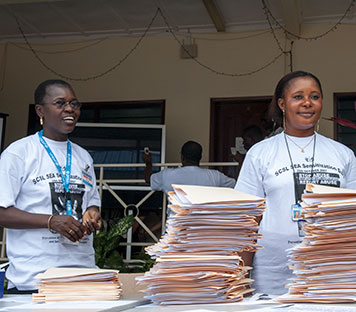 Throughout the lifespan of the Court, the Personnel Section was responsible for the recruiting, hiring and retention of international and national staff, as well as contractors and interns, who worked at the Special Court’s offices in Freetown, The Hague, and New York. The Section was also responsible for assisting personnel in upgrading their skills, and assisted national staff with job-seeking skills and employment after working at the Court. Ultimately, the Personnel Section was responsible for the downsizing of posts in line with the Special Court’s completion strategy.
Throughout the lifespan of the Court, the Personnel Section was responsible for the recruiting, hiring and retention of international and national staff, as well as contractors and interns, who worked at the Special Court’s offices in Freetown, The Hague, and New York. The Section was also responsible for assisting personnel in upgrading their skills, and assisted national staff with job-seeking skills and employment after working at the Court. Ultimately, the Personnel Section was responsible for the downsizing of posts in line with the Special Court’s completion strategy.
The Personnel Section was also responsible for determining and advising staff members on their benefits and entitlements on the basis of their contractual status; for administering, reviewing and providing advice on the interpretation and application of the Special Court’s personnel policies, regulations and rules; and for reviewing/approving paperwork pertaining to staff members, contractors and consultants. This included the issuance of personnel actions, appointments, extensions of appointments, notifications on separation, annual leave, sick leave; providing advice and support to managers on human resources-related matters, and ensuring compliance with laid-down procedures and, exit interviews on end of service.
Situated within the Personnel Section was the Travel Unit, which was responsible for all official official travel and for arranging travel for international staff on home leave.
In 2008, in conjunction with the United Nations, the Personnel Section conducted a highly-acclaimed Sexual Exploitation and Abuse (SEA) training for all Special Court staff in Freetown.
 The Personnel Section conducted a series of trainings for national staff on CV-writing and job interviewing skills, and provided referrals and guidance to staff members endeavouring to join the mainstream United Nations offices and agencies and other institutions. Personnel also provided counseling to staff who were being downsized.
The Personnel Section conducted a series of trainings for national staff on CV-writing and job interviewing skills, and provided referrals and guidance to staff members endeavouring to join the mainstream United Nations offices and agencies and other institutions. Personnel also provided counseling to staff who were being downsized.
